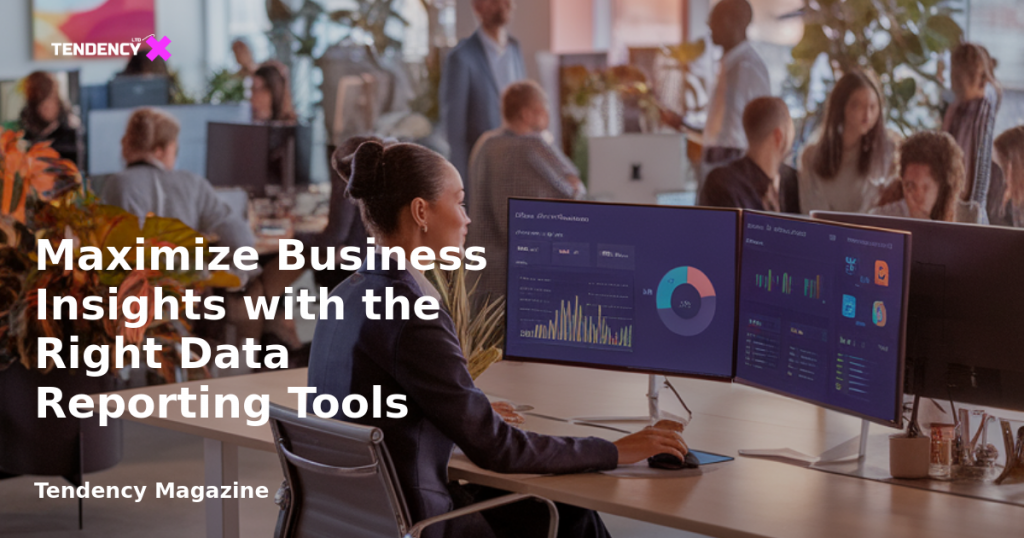Maximize Business Insights with the Right Data Reporting Tools

Understanding Data Reporting Tools
Data reporting tools are software applications designed to collect, process, and present data in a user-friendly format. These tools extract information from various data sources and generate reports that are easy to interpret, allowing businesses of all sizes to leverage data effectively. Whether you’re a small startup or a large corporation, data reporting tools can provide valuable insights into your business performance, helping you make data-driven decisions with confidence.
Types of Data Reporting Tools
Business Intelligence (BI) Tools
BI tools serve as a comprehensive dashboard for businesses, aggregating data from multiple sources such as CRM systems, cloud databases, and social media platforms. They offer a holistic view of your company’s performance by generating custom reports and visual charts that are easy to understand. BI tools are ideal for businesses looking to gain insights from diverse data sets and streamline their decision-making processes.
Corporate Performance Management (CPM) Systems
While similar to BI tools, CPM systems focus more on specific business performance metrics. They help businesses define, track, and improve key performance indicators (KPIs) such as revenue growth, customer satisfaction, and conversion rates. By providing detailed insights into KPI progress, CPM tools enable businesses to identify areas for improvement and allocate resources effectively.
Marketing Analytics Software
Marketing analytics tools consolidate data from various marketing channels, including social media, email, and ecommerce platforms. They transform marketing data into insightful reports that reveal how well your campaigns are performing and how effectively you’re reaching your target audience. These tools are essential for businesses looking to optimize their marketing strategies and maximize return on investment.
Information Technology (IT) Reporting Tools
IT reporting tools focus on monitoring and managing a company’s networking infrastructure. They provide insights into system performance, user activity, and potential issues, ensuring that your IT operations run smoothly. By drawing data from multiple sources, these tools offer a comprehensive view of your IT landscape, helping you address challenges proactively.
Benefits of Using Data Reporting Tools
Data reporting tools offer numerous advantages to businesses seeking to leverage their data effectively:
- Time Efficiency: Automated reporting workflows save time by generating reports quickly and accurately, freeing up valuable resources for other tasks.
- Customizable Reports: Businesses can tailor reports to their specific needs, focusing on the KPIs that matter most to them.
- Real-Time Insights: With up-to-date data at your fingertips, you can make informed decisions based on the latest information.
- Predictive Analytics: Advanced tools use AI to forecast trends and provide actionable insights, enabling businesses to anticipate future opportunities and challenges.
- Data Visualization: Transform raw data into visually appealing charts and graphs, making complex information easy to understand and share.
Choosing the Right Reporting Tool for Your Business
Selecting the right reporting tool involves considering several factors:
Assessing Business Needs
Identify the specific features and capabilities your business requires. Whether you need a tool for basic data analysis or advanced predictive analytics, choose a platform that aligns with your operational goals and industry requirements.
User-Friendly Software
Not every team member is a data expert. Look for tools with intuitive interfaces and user-friendly features, such as drag-and-drop functionalities and pre-built templates, to ensure ease of use for all users.
Organizational Structure Considerations
For small businesses or solopreneurs, choose tools that offer self-service analytics without a steep learning curve. Larger organizations may require more robust solutions with multi-user access and collaboration features.
Key Features to Look For
Ensure the tool you choose offers essential features such as dataset integration, scalability, and flexible visual reporting options. These features will help you connect various data sources, handle large data sets, and present insights effectively.
Recommended Reporting Tools for Small Businesses
Shopify Analytics
Shopify Analytics provides a comprehensive platform for monitoring sales, tracking conversion rates, and analyzing web traffic. With customizable dashboards, businesses can focus on the KPIs that matter most to them.
Zoho Analytics
Zoho Analytics offers self-service analytics with AI-driven insights, allowing businesses to generate visual reports from raw data. Its forecasting capabilities provide valuable recommendations based on customer data.
Looker Studio
Looker Studio, formerly Google Data Studio, connects with Google Workspace apps to create interactive dashboards and reports. Its cloud-based nature and ready-made templates make it an accessible option for businesses.
Microsoft Power BI
Power BI is known for its connectivity with Microsoft 365 and robust data visualization capabilities. It’s suitable for businesses looking to handle large data sets and gain insights from a supportive user community.
HubSpot
HubSpot’s marketing reporting tool and CRM platform offer AI and automation features, helping businesses organize data from customer interactions and streamline marketing efforts.
Frequently Asked Questions About Reporting Tools
What is a reporting tool?
A reporting tool is a software application that extracts data from various sources and generates reports that are easy to interpret, providing valuable insights into business performance.
What are the four common types of reporting tools?
The four common types of reporting tools are Business Intelligence (BI) tools, Corporate Performance Management (CPM) systems, Marketing Analytics Software, and Information Technology (IT) Reporting Tools.
What is the most popular reporting tool?
Shopify Analytics, Zoho Analytics, HubSpot, Microsoft Power BI, and Looker Studio are popular choices due to their robust features and connectivity with other platforms.
Is Excel a reporting tool?
While Excel can be used for basic data management and chart generation, it lacks the advanced features and automation capabilities of dedicated reporting software.
In conclusion, data reporting tools are essential for businesses looking to leverage their data effectively. By choosing the right tools, you can transform raw data into actionable insights, streamline decision-making processes, and drive business growth. Evaluate your business needs, explore available options, and select the tools that best align with your goals and capabilities.
2025 Tendency LTD. All rights reserved.

